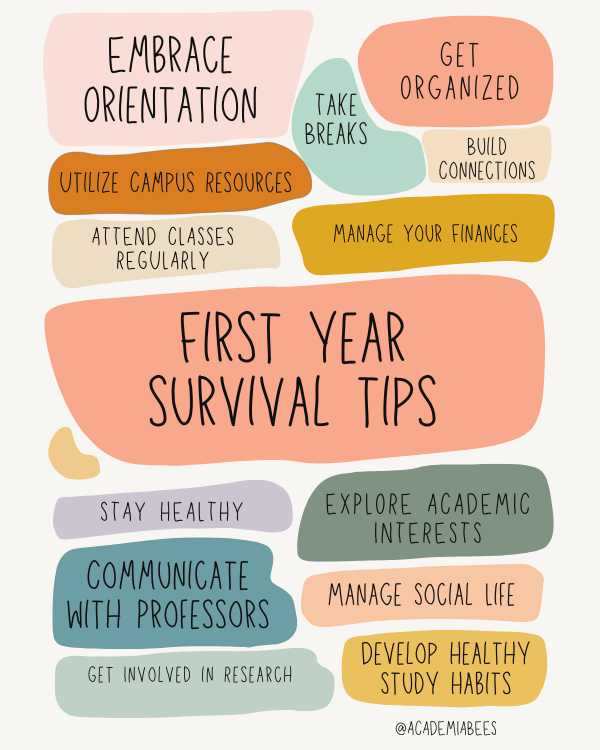Starting your college journey as a freshman can be both exciting and overwhelming. It’s a time of new beginnings, independence, and personal growth. To make the most of your freshman year and ensure a successful transition, we’ve compiled 25 valuable tips to help you navigate the challenges and thrive in this new chapter of your academic life.
25 Tips to Help You Survive and Thrive in Your Freshman Year
- Embrace Orientation: Attend orientation programs to familiarize yourself with campus, meet fellow students, and get to know important resources.
- Get Organized: Create a system for managing your schedule, assignments, and deadlines. Utilize digital tools or traditional planners to stay on top of your responsibilities.
- Prioritize Time Management: Establish a routine that balances academics, social activities, and self-care. Set realistic goals and allocate time accordingly.
- Build Connections: Introduce yourself to classmates, join clubs, and engage in campus activities to meet new people and expand your network.
- Utilize Campus Resources: Take advantage of academic support services, such as tutoring centers, writing labs, and career development offices.
- Attend Classes Regularly: Be present and actively participate in classes. Take notes, ask questions, and engage with the material.
- Establish Study Habits: Find a study environment that suits your preferences, whether it’s the library, a coffee shop, or your dorm room. Experiment with study techniques to discover what works best for you.
- Manage Your Finances: Create a budget, track your expenses, and avoid unnecessary debts. Explore financial aid options and seek guidance from the college’s financial aid office.
- Seek Help When Needed: Don’t hesitate to reach out to professors, advisors, or mentors for assistance or guidance with academic or personal challenges.
- Stay Healthy: Take care of your physical and mental well-being. Eat nutritious meals, exercise regularly, and prioritize self-care activities.
- Find a Support System: Connect with friends, roommates, or campus support groups to share experiences and provide mutual support.
- Explore Academic Interests: Take a variety of classes, even those outside your major, to discover new interests and potential career paths.
- Stay Organized with Assignments: Keep track of due dates, create study schedules, and break down assignments into manageable tasks.
- Practice Self-Reflection: Set aside time for self-reflection and introspection. Evaluate your goals, progress, and areas for personal growth.
- Be Open to New Perspectives: College is a diverse community. Embrace the opportunity to learn from people with different backgrounds, cultures, and beliefs.
- Seek Internship and Job Opportunities: Explore internships, part-time jobs, or campus employment to gain practical experience and develop professional skills.
- Take Breaks: Avoid burnout by scheduling regular breaks and downtime. Engage in activities that relax and recharge you.
- Communicate with Professors: Establish open lines of communication with your professors. Attend office hours and ask questions when needed.
- Get Involved in Research: Explore research opportunities within your field of interest. Speak with professors about potential research projects or join research groups on campus.
- Manage Your Social Life: Strike a balance between socializing and focusing on your studies. Find healthy ways to have fun and make friends.
- Explore the Surrounding Community: Venture beyond the campus boundaries and discover the local community. Attend cultural events, visit museums, or volunteer for local organizations.
- Develop Healthy Study Habits: Find the study techniques that work best for you, whether it’s studying in short bursts or dedicating longer sessions.
- Take Care of Your Mental Health: Prioritize self-care and seek support from campus counseling services or mental health resources if needed.
- Stay Engaged in Campus Life: Attend campus events, guest lectures, and workshops to expand your knowledge and engage with the college community.
- Embrace Growth and Change: College is a transformative experience. Embrace the challenges, learn from setbacks, and use them as opportunities for personal growth.

If you are an introvert then you must read a helpful guide about introverted students.
FAQ’s
To thrive during your freshman year, prioritize time management, establish study habits, build connections, utilize campus resources, and take care of your physical and mental well-being.
Balancing academics and social life involves effective time management, setting priorities, creating a study schedule, and finding a healthy balance between socializing and focusing on your studies.
Preparing for the first year of college involves attending orientation programs, getting organized, familiarizing yourself with campus resources, and mentally preparing for the transition to college life.
Essential tips for academic success as a college freshman include attending classes regularly, establishing good study habits, seeking help when needed, managing your finances, and staying organized with assignments.
To make the most of your college experience as a freshman, explore academic interests outside your major, get involved in campus activities and clubs, seek internship and job opportunities, and take breaks to relax and recharge.
Effective time management as a college freshman involves creating a schedule, setting realistic goals, prioritizing tasks, utilizing time-blocking techniques, and avoiding procrastination.
College freshmen can utilize various campus resources such as tutoring centers, writing labs, career development offices, counseling services, and student support groups.
To maintain a healthy work-life balance, establish boundaries, prioritize self-care activities, communicate your needs to roommates and peers, and allocate time for hobbies and personal interests.
Handling academic and personal challenges in your first year of college involves seeking support from professors and advisors, practicing self-reflection, utilizing campus counseling services, and staying resilient in the face of setbacks.
As a college freshman living on campus, expect to adjust to dorm life, build relationships with roommates and neighbors, navigate communal living spaces, and explore campus amenities and activities.
Conclusion
Your freshman year is a pivotal time that sets the foundation for your college journey. By implementing these 25 tips, you can navigate the challenges, make the most of the opportunities, and set yourself up for success throughout your college years. Remember, it’s a time of growth, exploration, and self-discovery, so embrace the journey and enjoy every moment!